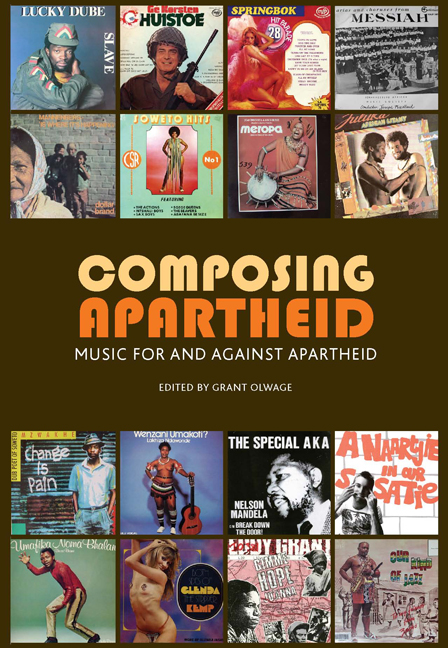Book contents
- Frontmatter
- Dedication
- Contents
- Acknowledgements
- Introduction
- Chapter 1 Back to the Future? Idioms of ‘displaced time’ in South African composition
- Chapter 2 Apartheid's Musical Signs: Reflections on black choralism, modernity and race-ethnicity in the segregation era
- Chapter 3 Discomposing Apartheid's Story: Who owns Handel?
- Chapter 4 Kwela's White Audiences: The politics of pleasure and identification in the early apartheid period
- Chapter 5 Popular Music and Negotiating Whiteness in Apartheid South Africa
- Chapter 6 Packaging Desires: Album covers and the presentation of apartheid
- Chapter 7 Musical Echoes: Composing a past in/for South African jazz
- Chapter 8 Singing Against Apartheid: ANC cultural groups and the international anti-apartheid struggle
- Chapter 9 ‘Nkosi Sikelel' iAfrika’: Stories of an African anthem
- Chapter 10 Whose ‘White Man Sleeps’ Aesthetics? and politics in the early work of Kevin Volans
- Chapter 11 State of Contention: Recomposing apartheid at Pretoria's State Theatre, 1990–1994. A personal recollection
- Chapter 12 Decomposing Apartheid: Things come together
- Chapter 13 Arnold van Wyk's Hands
- Contributors
- Index
Chapter 11 - State of Contention: Recomposing apartheid at Pretoria's State Theatre, 1990–1994. A personal recollection
Published online by Cambridge University Press: 20 April 2018
- Frontmatter
- Dedication
- Contents
- Acknowledgements
- Introduction
- Chapter 1 Back to the Future? Idioms of ‘displaced time’ in South African composition
- Chapter 2 Apartheid's Musical Signs: Reflections on black choralism, modernity and race-ethnicity in the segregation era
- Chapter 3 Discomposing Apartheid's Story: Who owns Handel?
- Chapter 4 Kwela's White Audiences: The politics of pleasure and identification in the early apartheid period
- Chapter 5 Popular Music and Negotiating Whiteness in Apartheid South Africa
- Chapter 6 Packaging Desires: Album covers and the presentation of apartheid
- Chapter 7 Musical Echoes: Composing a past in/for South African jazz
- Chapter 8 Singing Against Apartheid: ANC cultural groups and the international anti-apartheid struggle
- Chapter 9 ‘Nkosi Sikelel' iAfrika’: Stories of an African anthem
- Chapter 10 Whose ‘White Man Sleeps’ Aesthetics? and politics in the early work of Kevin Volans
- Chapter 11 State of Contention: Recomposing apartheid at Pretoria's State Theatre, 1990–1994. A personal recollection
- Chapter 12 Decomposing Apartheid: Things come together
- Chapter 13 Arnold van Wyk's Hands
- Contributors
- Index
Summary
Introduction
In the maelstrom of cultural debate that attended South Africa's transition towards non-racial democracy in the early 1990s, few institutions were more vocally held to symbolise the apartheid cultural apparatus, at least as far as the performing arts were concerned, than Pretoria's State Theatre. Even if one never entered the complex, adjacent to a domed plaza housing a larger-than-life bust of former apartheid prime minister JG Strijdom, the massive modernist structure situated solidly in the centre of the apartheid capital architecturally and symbolically bespoke a familiarity with Pretoria's bureaucratic and political establishment, and reciprocally invested a city often caricatured for its civil servant mentality with the conspicuous trappings of Western high culture.
As a schoolchild growing up in the city, I was among the many Pretorians marshalled to line Church Street for the grand opening of the facility in the week of Republic Day in 1981. I had dutifully donned my Boy Scout uniform, and what I recall as an early lesson in the banality of public pageantry reached a personal anticlimax when the black limousine of then-State President Marais Viljoen raced past me. The president hardly deigned to be seen, let alone to wave triumphantly as I had expected, as fanfares echoed out from the balconies of the self-proclaimed ‘new world centre’ and dignitaries arrived by the Mercedes-full.
Associations between the State Theatre and the apartheid order extended, of course, well beyond physical proximity and the semiotics of public space. The State Theatre was the headquarters of the Performing Arts Council of the Transvaal (PACT), the largest of the four provincial performing arts councils, and offerings presented on its stages were among the few to receive a government subsidy in the old South Africa. Viewed from the outside, at the most commonsensical level, the State Theatre and the apartheid state were clearly on intimate terms.
Yet, with one notable exception, much has been assumed and relatively little documented about the place of South Africa's publicly funded theatres in promulgating ‘apartheid culture’ on the shifting terrain of national cultural politics during the apartheid era. For one thing, PACT and its counterparts in other provinces (PACOFS in the Free State, NAPAC in then-Natal and CAPAB in the Cape) were established in the mid-1960s on cultural terrain that had already irrevocably been shaped by colonialism and apartheid's coercive physical and cultural removals of the 1950s.
- Type
- Chapter
- Information
- Composing ApartheidMusic for and against apartheid, pp. 237 - 254Publisher: Wits University PressPrint publication year: 2008



